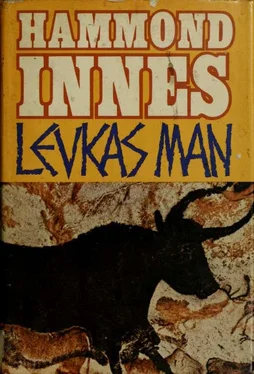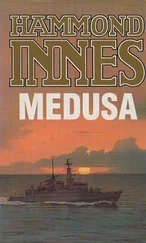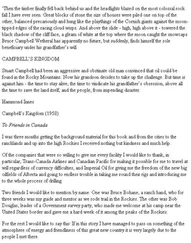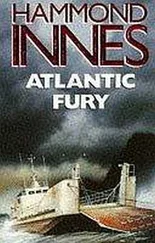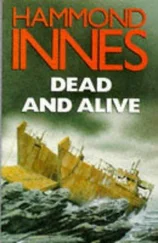Hammond Innes - Levkas man
Здесь есть возможность читать онлайн «Hammond Innes - Levkas man» весь текст электронной книги совершенно бесплатно (целиком полную версию без сокращений). В некоторых случаях можно слушать аудио, скачать через торрент в формате fb2 и присутствует краткое содержание. Жанр: Прочие приключения, на английском языке. Описание произведения, (предисловие) а так же отзывы посетителей доступны на портале библиотеки ЛибКат.
- Название:Levkas man
- Автор:
- Жанр:
- Год:неизвестен
- ISBN:нет данных
- Рейтинг книги:3 / 5. Голосов: 1
-
Избранное:Добавить в избранное
- Отзывы:
-
Ваша оценка:
- 60
- 1
- 2
- 3
- 4
- 5
Levkas man: краткое содержание, описание и аннотация
Предлагаем к чтению аннотацию, описание, краткое содержание или предисловие (зависит от того, что написал сам автор книги «Levkas man»). Если вы не нашли необходимую информацию о книге — напишите в комментариях, мы постараемся отыскать её.
Levkas man — читать онлайн бесплатно полную книгу (весь текст) целиком
Ниже представлен текст книги, разбитый по страницам. Система сохранения места последней прочитанной страницы, позволяет с удобством читать онлайн бесплатно книгу «Levkas man», без необходимости каждый раз заново искать на чём Вы остановились. Поставьте закладку, и сможете в любой момент перейти на страницу, на которой закончили чтение.
Интервал:
Закладка:
"I always thought of him as an anthropologist."
"Anthropology is a broad term covering the whole study of man."
"Dr. Gilmore is a leading authority on Stone Age Man," the girl said. "He is the author of Neolithic Settlements of Eastern Europe."
I took them up to the study and the old man paused in the doorway, his eyes travelling over the room. "I take it that this is where Pieter worked. I often wondered. ." His gaze went unerringly to the bureau and he walked over to it and stood for a moment, peering closely at the skull and the artefacts. He was like a bird, his eyes bright, his movements quick. But age showed in the stoop of his shoulders and in the dry, parchment texture of his skin, which was slightly chapped with the winter's cold. "There you are. Miss Winters," he said, turning to the girl. "That's what all the trouble was about." His voice, his whole manner, was extraordinarily boyish. He shook his head. "Too clever. Too clever by half, you see."
I sat him down at the desk and offered him a cigarette. He hesitated, smiling quietly to himself. "I have been told to cut down." But he took one all the same and I lit it for him.
"You wanted to see me," I said.
He nodded and leaned back in the swivel chair, holding the cigarette between thumb and forefinger, puffing at it quickly, drawing the smoke into his lungs. "But I don't know whether it will help. I was hoping to find you-" he hesitated- "a more academic type. Now I'm not certain that it will do any good, particularly as I gather you haven't seen your father for some time."
"Not for eight years," I said.
"It's as long as that, is it?"
"We didn't get on very well. ."
"No, no-I understand. Miss Winters has told me something of your relationship. A very difficult man. Very brilliant. Too brilliant in some ways. I would go further-a genius. Men of that calibre are never easy to live with." He waved his hand at me. "Sit down, my dear fellow, sit down."
I hesitated. As long as I was standing I felt I could cut the interview short. I didn't see what he wanted, why the girl had brought him here. And I didn't want to get involved. "I know nothing about his world-"
"Of course. I understand. And that makes it very difficult for me-to explain my sense of uneasiness." He looked at me, a long, appraising stare, his eyes grey like pebbles as they caught the light from the windows. "But perhaps that's an advantage-that you know nothing about his world." And then he surprised me by saying, "I met your mother once. In London during the last war-nineteen forty-two, I think; I was up for a meeting of the Royal Society and he brought her to see me at my hotel. A charming woman, very good for him. Gave him confidence. They should have married." He was smiling to himself, a gentle, quiet smile. "Companionship of that sort would have made all the difference. She had a strong, unselfish personality."
"He has a strong personality, too," I said, wondering at his reference to a sense of uneasiness.
"Yes, but not unselfish." And then abruptly he said, "He kept a Journal. Has done for many years. Did you know that?"
"A leather-covered book?"
He nodded.
"Yes," I said. "There's a secret cavity in the bureau over there. That's where he kept it." And without thinking I told him how I had once surprised him writing in it.
He nodded. "Yes, that would be it. A very personal document."
"Well, it's not in the usual place," I said, thinking that that was what he had come for. "I imagine he's taken it with him."
But he shook his head. "No, I have it. And there are altogether three volumes of it now. I've just read them. That's why I wanted to see him. It's a very strange, very disturbing record-not a diary exactly, something much deeper, more personal. It covers about twenty years of his life-intermittent entries, about himself, his thoughts, his inmost fears and hopes. And then suddenly, when he was ill. ." He stopped there and turned to the girl. "You tell him. Miss Winters. It will have more immediacy coming from you."
She nodded. "He was going to burn it. That was the night I telephoned for a doctor. He had me light a fire here in the study. He was in bed at the time. I thought perhaps he was feeling better, and then he sent me out for something. When I came back, I found him down here, half-collapsed in his chair, and the Journals were lying on the floor. Several pages had already been ripped out and their charred remains were lying in the grate. When I asked him why he had done it, he said, 'I don't want him to have it. I don't want anybody to have it.' And he asked me to put it on the fire for him. 'That's the best place for it.' "
She was sitting very tense, her hands clasped tight in her lap. And when I asked her who it was he wanted to conceal the Journal from, she looked at me, her eyes wide. "Why, from you, of course." And she added, "But I wouldn't do it. I refused. And when he began to recover, I think he was glad. In the end he sent it to Dr. Gilmore. I posted it for him just before he left. He was up half the night writing a letter of explanation."
Gilmore nodded. "It needed explanation. In toto it amounts to an indictment of Man based on a self-portrait as it were." He hesitated. "This is something it may be difficult for you to understand. A practical man, you're naturally impatient of the sort of introspective self-analysis on which Pieter Van der Voort was engaged. 'Probing the ultimate depths of Man's aggressive instincts,' he called it, and he talked of the Devil and a spiritual struggle. It's all there, all his instinctual urges-the good and the bad. It goes back to his original thesis." And he added a little wistfully, "I should have come here before-as soon as I had read it. A man like that-alone, delving into the fundamental problems of mankind … I should have come at once."
"Then why didn't you?" I asked.
"My dear fellow, if one did everything one ought to. . But I did come here once. When was it? In nineteen fifty-four, I think, for a conference rather like the one that has brought me to Holland now. But there was nobody here, the house empty. He was in Russia, and of course his reputation. ." He gave a little sigh. "You must realize I had an official position." '
"But since you retired," I said. "Surely you could have-"
"My dear boy." He held up his hand, smiling. "That is just the point. Until last vac I was still teaching, still Reader in Physical Anthropology. Then all the business of handing over. I had the money to travel-a stroke of extraordinary luck-but never the time. Students are very demanding and to teach well …" He drew a last puff from his cigarette and stubbed it out in the onyx bowl on the desk that had come from Turkey. "How I envy men like Teilhard de Chardin- Java Man, Pekin Man, off to Africa to check on Leakey's discoveries. As a Jesuit he had his problems, but he wasn't tied to generations of students. And your father-I even envy him, too, in a way. You know he was brought up in France? His family had a house at St. Leon-sur-Vezere and he had the priceless advantage of coming under the influence of the Abbe Breuil at the precocious age of eleven. This was when Breuil and other French savants were digging into the limestone caves of the Vezere to reveal more and more engravings and paintings done by men fifteen to sixty thousand years ago. It was a remarkable experience for a young boy and it set him on his way at a very early age, marked him for life, you might say."
He leaned back, his eyes half-closed. "Breuil, Peyrony, Capitan, Riviere-he met them all at the most impressionable age, squirming down limestone cracks, exploring caves that no man had been in for thousands of years. It was not only
the savants, you see, it was the fact that he was living and breathing the prehistory of a long dead age of Man's evolution." He nodded his head slowly, opening his eyes to gaze out of the window. "A boy with that background. ." He sighed, I think in envy. "Hardly surprising that he was the most dedicated student I ever had through my hands. But the thesis he elected to work on … It was on the Weapon as the basis of Man's development." He shook his head, smiling a little sadly. "They didn't like it, of course. It was just after the first war and he was ahead of his time. He only just scraped through, and that annoyed him. He went off to South Africa, where his family still had relations. In fact, I think they returned there just before the Germans invaded France in nineteen forty."
Читать дальшеИнтервал:
Закладка:
Похожие книги на «Levkas man»
Представляем Вашему вниманию похожие книги на «Levkas man» списком для выбора. Мы отобрали схожую по названию и смыслу литературу в надежде предоставить читателям больше вариантов отыскать новые, интересные, ещё непрочитанные произведения.
Обсуждение, отзывы о книге «Levkas man» и просто собственные мнения читателей. Оставьте ваши комментарии, напишите, что Вы думаете о произведении, его смысле или главных героях. Укажите что конкретно понравилось, а что нет, и почему Вы так считаете.
